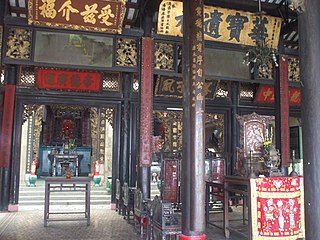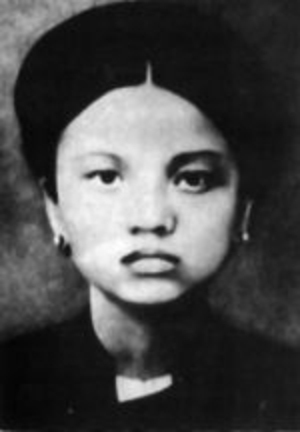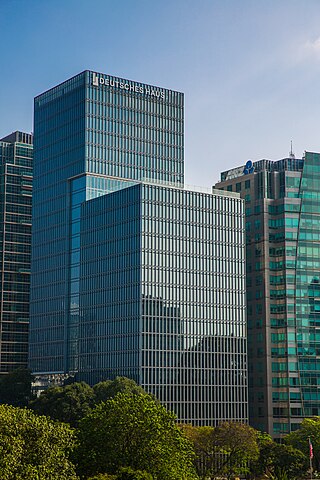
Ho Chi Minh City, commonly referred to by its former name Saigon, is the most populous city in Vietnam, with a population of around 10 million in 2023. The city's geography is defined by rivers and canals, of which the eponymously-named Saigon River is the largest. As a municipality, Ho Chi Minh City consists of 16 urban districts, five rural districts, and one municipal city (sub-city). As the largest financial centre in Vietnam, Ho Chi Minh City has the highest gross regional domestic product out of all Vietnam provinces and municipalities, contributing around a quarter of the country's total GDP. Ho Chi Minh City's metropolitan area is ASEAN's 6th largest economy, also the biggest outside an ASEAN country capital.

Hồ Chí Minh, colloquially known as Uncle Ho or just Uncle (Bác), and by other aliases and sobriquets, was a Vietnamese communist revolutionary, nationalist, and politician. He served as prime minister of the Democratic Republic of Vietnam from 1945 to 1955 and as president from 1945 until his death in 1969. Ideologically a Marxist–Leninist, he was the Chairman and First Secretary of the Workers' Party of Vietnam, the predecessor of the current Communist Party of Vietnam.

The Hongkong and Shanghai Banking Corporation Limited, commonly known as HSBC and formerly known as HongkongBank, is the Hong Kong-based Asia-Pacific subsidiary of the HSBC banking group, for which it was the parent entity until 1991. The largest bank in Hong Kong, HSBC operates branches and offices throughout the Indo-Pacific region and in other countries around the world. It is also one of the three commercial banks licensed by the Hong Kong Monetary Authority to issue banknotes for the Hong Kong dollar.

The Hoa people, also known as Vietnamese Chinese are the citizens and nationals of Vietnam of full or partial Han Chinese ancestry. Chinese migration into Vietnam dates back millennia but allusions to the contemporary Hoa today mostly refers to people of Chinese ancestry who immigrated to Vietnam during the 18th century, who especially trace their ancestry to various southern Chinese provinces. The Hoa are an ethnic minority group in Vietnam as part of the Chinese community there, and can also be found in other regions such as in the Americas. They may also be called "Chinese-Vietnamese" or "Vietnamese Chinese" by the Vietnamese.

Đồng Sĩ Nguyên, also spelled Đồng Sỹ Nguyên, other name Nguyễn Hữu Vũ, was a Vietnamese soldier and politician. He was Deputy Prime Minister of Vietnam, a member of the Politburo of the Communist Party of Vietnam, lieutenant-general of the North Vietnamese Army, and minister of transport of Vietnam. He was born in Quảng Bình Province, home to general Võ Nguyên Giáp and Ngô Đình Diệm, president of the Republic of Vietnam.

District 2 is a former urban district of Ho Chi Minh City, Vietnam. As of 2010, the district had a population of 140,621 and a total area of 50 km².

India–Vietnam relations, also knows as Indian-Vietnamese relations, are the bilateral relations of India and Vietnam.
The North–South express railway is a proposed high speed railway in Vietnam. The line would begin in Lạng Sơn and end in Cà Mau, connecting the two most urbanised areas in the country: Hanoi in the North, and Ho Chi Minh City in the South. The total proposed length would be 2,070 kilometres (1,290 mi).

Zeng Xueming, known in Vietnamese as Tăng Tuyết Minh, was a Chinese midwife. She was a Catholic from Guangzhou and it was claimed that she married Nguyễn Ái Quốc in October 1926. They lived together until April 1927, when Hồ fled China following an anti-communist coup. Despite several attempts to renew contact by both Zeng and Hồ, the couple never reunited. Zeng and Hồ were never legally divorced, nor was their marriage ever annulled. There is uncertainty of true happenings as some say it was a marriage of convenience to avoid Hồ's political persecution during his time in Kuomintang-ruled China, whilst others say the story was never true to begin with, and was only a hypothesis.
Bien Viet Securities J.S.C. (CBV) is Vietnam provider of financial and investment services. CBV has been well known as the first and largest provider of Vietnam’s financial market indexes and economic indicators. Vietnam Securities Indexes is the first equity index that composes all stocks listed on the two exchanges in Hanoi and Ho Chi Minh City. Vietnam Finance Indexes family is the first family of Vietnam finance indexes to be sponsored and introduced by Bloomberg to global financial institutions. The index system developed by CBV is the world's largest index family for Vietnam with over 450 equity indexes, 50 fixed income indexes, and over 50 indexes in other categories.
Nguyễn Xuân Minh is the Executive Chairman of Techcom Securities, a subsidiary of Techcombank – a leading joint stock bank in Vietnam. Techcom Securities (TCBS) is the leading Wealthtech company and is the largest securities company in Vietnam in terms of profit and brand value. TCBS helps domestic companies raise in aggregate more than U$3 billion per year via Debt and Equity Capital Markets in Vietnam. It also has more than 80% market share in trading of local listed corporate bonds in Vietnam. Consecutively, Techcom Securities was named the Best Bond House in Vietnam for 2007–2016, 2008–2017 and 2009–2018 by Alpha Southeast Asia and the Best Debt Capital Markets House for 2017, 2018 and 2019 in Vietnam by FinanceAsia.

Nguyễn Thị Minh Khai was a Vietnamese revolutionary and a leader of the Indochinese Communist Party during the 1930s.
Lawrence S. Ting was a Taiwanese decorated soldier and a pioneer businessman who became one of the largest foreign investors in Vietnam. As founder of Phu My Hung Corporation and Saigon South Urban Development Project, Lawrence Ting was instrumental in the southward expansion of Ho Chi Minh City. Today, the neighborhood created by Ting has become “a new sustainable, inclusive, knowledge-based urban center.” Ting received the Ho Chi Minh City Medal of Honor in 1993 and Certificates of Merit of the Government of Vietnam from the Prime Minister in 1997 and 2001. In the 2013 Harvard Business Review article The Big Idea, Building Sustainable Cities, John Macomber of Harvard Business School chose Phu My Hung's Saigon South Development Project started by Lawrence Ting as one of the leading sustainable urban development examples in the world. “Phu My Hung was promoted by industrialists who took a long-term ‘build and hold’ approach and had an infrastructure-first master plan...The Model of Phu My Hung, where thoughtful, long-term oriented, private-sector actors help the world create efficient water, power, and transit solutions, can-and must-be replicated.” Ting received posthumously the Friendship Medal of Vietnam from President Nguyen Minh Triet in December 2007. Lawrence S. Ting School in Ho Chi Minh City, a private non-profit junior high and senior high school is named after him. In 2010, the school became the first Microsoft Pathfinder School in Vietnam. In 2020, Taipei American School named its middle school Lawrence S. Ting Middle School in honor of Ting.

The Deutsches Haus Ho Chi Minh City is a building complex in Ho Chi Minh City, Vietnam, which was opened 2017. The 25-story building complex was initiated under a bilateral government agreement between Germany and Vietnam, with the purpose of setting standards for energy efficiency “made in Germany.” It is the location of the German Consulate General and other institutions and businesses, as well as a cultural and economic hub for German representation in Vietnam.
Vietnam Enterprise Investments Limited is a Cayman Islands-registered, closed-end investment trust managed by Dragon Capital It is invested in listed equity on the Ho Chi Minh and Hanoi stock exchanges in Vietnam. Established in 1995, and listed on the LSE, the fund is a constituent of the FTSE 250 Index with a net asset value of US$2.5bn. The chairman is Gordon Lawson. The portfolio manager is Vu Huu Dien.
VinaCapital is one of the largest investment management firms in Vietnam. As of 2023, the firm has more than $3.9 billion in assets under management.
Dominic Scriven is the founder and current chairman of Dragon Capital, the largest private investor in Vietnam.

Paris Commune Square is a small square located in District 1, downtown Ho Chi Minh City, Vietnam. It lies between Lê Duẩn Boulevard and Nguyễn Du Street and surrounds the Notre-Dame Cathedral Basilica of Saigon. This is also the starting point of the famous Đồng Khởi Street. The square is surrounded by two remarkable architectural works: Notre-Dame Cathedral and Central Post Office.

Trần Tiểu Vy is a Vietnamese model and beauty pageant titleholder who was crowned Miss Vietnam 2018. She represented Vietnam at the Miss World 2018 pageant.
Peter Cuong Franklin is a Vietnamese American chef and founder of Anan Saigon in Ho Chi Minh City, Vietnam, and Chôm Chôm in Hong Kong, specializing in "Cuisine Mới". Born in Da Lat, Vietnam, Franklin's mother Nguyễn Thị Như Thừa operated a noodle shop. Franklin fled Ho Chi Minh City as a child refugee on April 29, 1975 during the Fall of Saigon. He was later adopted by an American family, attending Fairfield College Preparatory School and Yale University.












